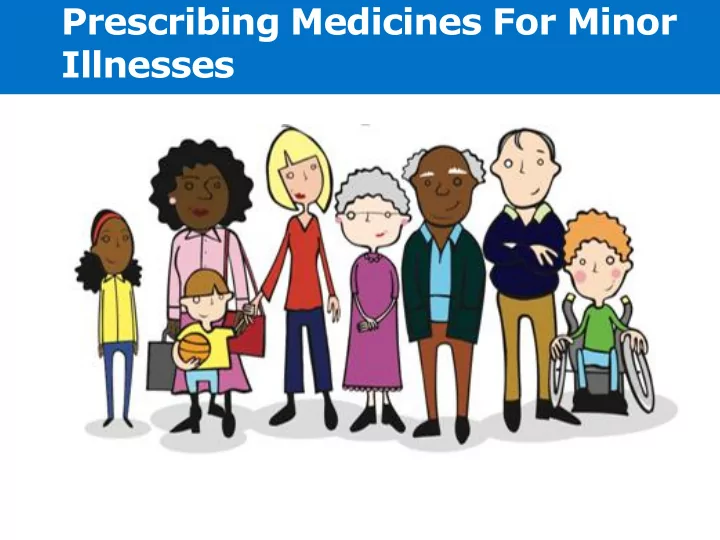

Prescribing Medicines For Minor Illnesses
The current picture
Did you know? • £589 million a year spent on medicines for minor conditions • Most minor illnesses will get better with time and treatments only help to relieve symptoms • For the majority of healthy people many minor illnesses can be treated through self- care without the need to see a GP Your local community • pharmacists give professional advice on what else you can do to help yourself.
Use of our resources Better use of NHS resources allows money to be spent where it is most needed, while improving patient outcomes. The NHS estimate £136m may be saved by restricting prescribing for minor illnesses. For every £1m saved on medicines for minor illnesses treatments could fund: • 39 more community nurses or • 270 more hip replacements or • 66 more drug treatments courses for breast cancer or • 1000 more drug treatment courses for Alzheimer’s or • 1040 more cataract operations
Public Feedback In 2017 NHS England and NHS Clinical Commissioners asked people what they thought about spending less on medicines for minor illness by supporting people to treatment themselves: 65% of people A stakeholder event was attended by agreed with The NHS propose groups including the a list of 33 illnesses the idea Patient Association, that can be treated National Voices and using medicines Health Watch from pharmacies or England, to test out supermarkets and further shape and refine the draft proposals
Conditions that can be treated using over the counter medicines
Example of Cost of Common Medicines Paracetamol Liquid 100mg/5ml, 100ml £1.77 Paracetamol Liquid 250mg/5ml, 100ml £2.99 Cetirizine 10mg tablets, 14 £0.99-£2.99 Paracetamol 500mg tablets, 16 £0.30
Exceptions. Healthcare staff would still prescribe for: The treatment of long term illnesses e.g. arthritis The treatment of illnesses that are not serious but stop someone living life normally e.g. severe or frequent migraines Illnesses that are not normally serious but are not getting better e.g. a cough that lasts more than 3 weeks Patients with complex needs Treatments that are only available on prescription To treat a symptom of a more serious illness
Exceptions Cont’d The medicine has a license which says it cannot be sold over the counter to certain groups of patients e.g. pregnant women or children If the medicine bought over the counter hasn’t worked Where the healthcare staff considers that an individual’s ability to self-manage is compromised because of social, medical or mental health vulnerability to the extent that their health and/or wellbeing could be adversely affected if left to self- care
Consultation • Three month national public consultation ran from 20 th December to 14 th March 2018 • 29 th March 2018 NHS England asked CCGs to consider the guidance, timescale for a decision and implementation during 2018
Questions for discussion • Q. What do you think about prescriptions being stopped for 33 common illnesses? • Q. Do you think that these prescriptions being stopped will affect some people more than others? • Q. Do you think there are any situations or groups of people who should still be prescribed medicines for these 33 illnesses, not covered by the exceptions?
What happens next • We will share your feedback with the CCG Governing Body • The CCG will review feedback and consider whether and when to implement the guidance
THANK YOU
Recommend
More recommend